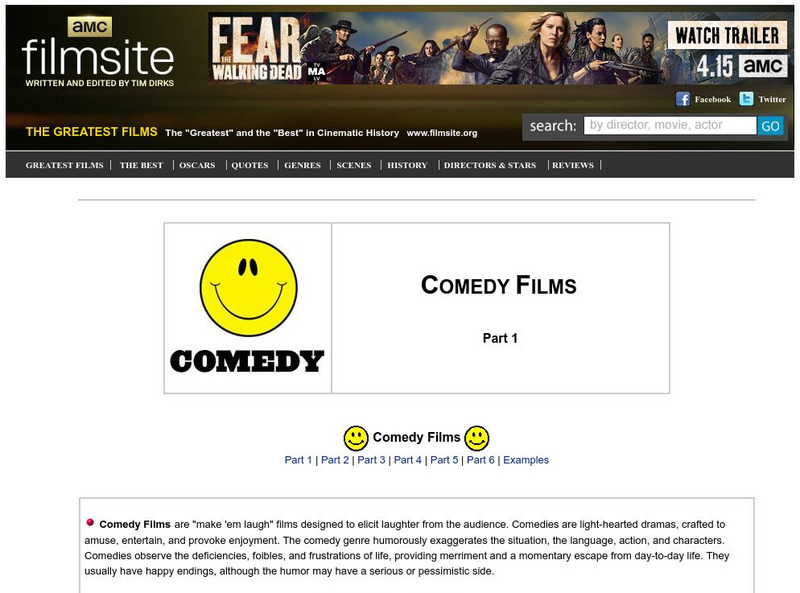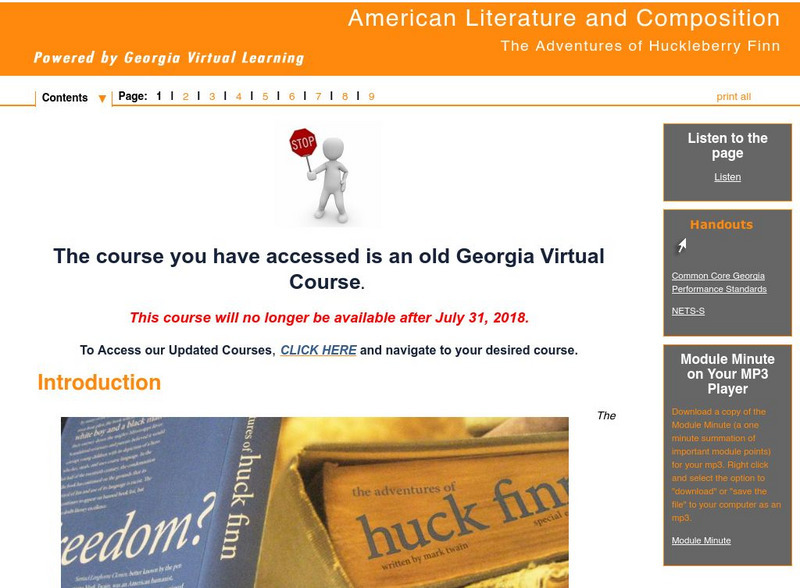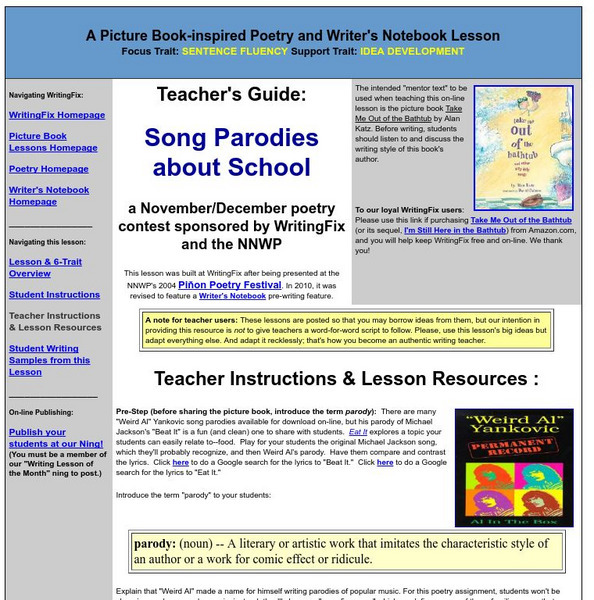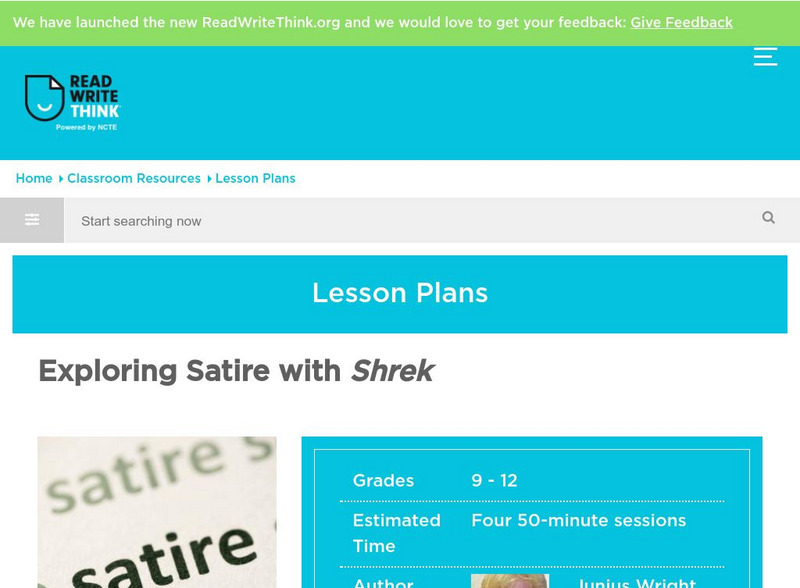Curated OER
Parody Hilarity
Upper grade and middle school writers study the art of parody. In this language arts lesson, learners study the work of Lewis Carroll, read and discuss parodies from the book, Alice in Wonderland, and construct their own parody based on...
Curated OER
Shakespearean Comedy on Film
This lesson will focus on the aspects of Shakespeare's comedy that become more evident in performance. By viewing clips of the same Shakespeare scene in different film versions, high schoolers have the opportunity to engage in a close...
Curated OER
Satire
The bite of comedy often rests on use of the literary devices detailed in this presentation. The definitions for terms like sarcasm, zeugma, and invective are followed by examples drawn from literature. Consider extending the lesson by...
Curated OER
Portrait Parody
Eighth graders use modern materials and technology to create a modern portrait modeled after a Renaissance picture.
Curated OER
Marketing to Teens: Parody Ads
High schoolers deconstruct advertising messages by analyzing parody ads and exploring the purpose of satire. Then they create their own parodies based on real ads discussed in class. A creative activity to extend any study of media,...
Curated OER
My Blackberry Isn't Working
This worksheet starts out on a strong note by using a humorous video called "My Blackberry Is Not Working" from BBC One to teach parody. While they watch the short video, viewers fill out a chart about the electronic brands, noting any...
Curated OER
Impersonating Great Poets Using "Science Verse" by Jon Scieszka
A great way to bring poetry and parody into your language arts classroom, this lesson mimics famous poems based on Jon Scieszka's Science Verse. The activity not only allows the class to see examples of poem parodies, but to create their...
Curated OER
Poetry
Explore the semantics of poetry with this higher-level presentation. With examples from Dickinson, Frost, and Dr. Seuss, the slides clearly explain the details of poetic structure, license, and schemes. You could use this in a language...
Curated OER
Parody
Expand your students' literary likings with this quick PowerPoint about parodies. A detailed definition of a parody on the second slide precedes different examples of parodies in pop culture. Tip: Show videos of famous parodies your...
Curated OER
Cartoons for the Classroom: A Parody of Broken Promises
Parodies of political figures are the lifeblood of the editorial cartoons in a free press. North Korea's nuclear threat provides young political scientists an opportunity to hone their critical thinking skills as they analyze a...
Curated OER
Satire in Fiction
Twelfth graders identify satire in various fictional texts. In this language arts instructional activity, 12th graders will learn to define satire, parody, and caricature. Students will identify different forms of satire in...
Curated OER
Parodies of Shakespeare
Students view a video clip about parodies. They identify the characteristics of a parody in Mark Twain's work as well. They practice writing Shakepeare like verses.
Curated OER
Funny Business
Students discuss how much they understand of satire and parody. They read an article about an Iraq news parody show. They create and act out their own parody skit. They write an essay about using humor in grave situations.
Curated OER
Tee-Hee T.V.
Students examine the concept of satire by reading lyrics to a song and reading "Soap and the Campus: A Web-Site Spoof Succeeds." They create treatments for parodies based on current television shows.
Curated OER
Satire: A Matter of Tone
Satire, anyone? After a review of terms associated with satire, viewers are directed to craft a 500-600 word piece of satire about a familiar hypocrisy.
Curated OER
Deciphering the Mechanics of Poetry
Eighth graders analyze a variety of poems to develop the ability to recognize and explain a variety pf poetic devises.
American Movie Classics Company
The Film Site: Comedy Films
This resource provides information about comedy films.
Georgia Department of Education
Ga Virtual Learning: American Literature: The Adventures of Huckleberry Finn
This lesson is an introduction to a unit on The Adventures of Huckleberry Finn by Mark Twain. It includes background infromation on the author and the text, a list of key terms, essential questions, and discusses the themes of the text...
Writing Fix
Writing Fix: An I Pod Inspired Poetry Lesson: Song Parodies About School
After celebrating (and singing) some of the delightful songs from Alan Katz's "Take Me out of the Bathtub" and listening to songs by Weird Al Yankovic, like "Eat It," students will discuss the concept of parody. To practice writing a...
ReadWriteThink
Read Write Think: Using Online Technology to Explore Characterization and Style
Young scholars use social networking sites to trace the development of characters by assuming the persona of a character on the class Ning and sending a set number of tweets, or status updates.
ReadWriteThink
Read Write Think: Exploring Satire With the Simpsons
Contains plans for three lessons that use the popular television show "The Simpsons" to teach about satire and satirical techniques. In addition to objectives and standards, this instructional plan contains links to PDF handouts and...
ReadWriteThink
Read Write Think: Exploring Satire With Shrek
The movie Shrek introduces the satirical techniques of exaggeration, incongruity, reversal, and parody. Students brainstorm fairy tale characteristics, identify satirical techniques, then create their own satirical versions of fairy tales.
Other
Bitlaw: Fair Use in Copyright
An article that explains the "fair Use" issues in the copyright law.
Quizlet
Quizlet: Literary Elements/humorous Fiction Terms Flashcards
Literary elements are included in this review exercise. Flashcards are provided for the following words: allusion, antagonist, dialogue, flashback, imagery, protagonist, symbol, dialect, hyperbole, idiom, irony, parody, pun, sarcasm,...






















